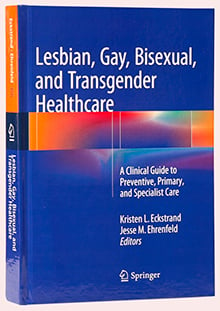Physicians often encounter lesbian, gay, bisexual and transgender (LGBT) patients without understanding the unique needs of this often marginalized population. A new textbook provides insights and clinical guidance on LGBT health care for practicing physicians, educators and medical students.
“Medical schools haven’t always provided the right training in LGBT health, and that has led to gaps in care for patients,” said Jesse Ehrenfeld, MD, an associate professor of anesthesiology, surgery, biomedical informatics and health policy at Vanderbilt University School of Medicine. “LGBT health is a relatively new field, and there is a growing recognition of the gap between the unique needs of LGBT patients and what most clinicians understand. Almost everyone could use help on this topic.”
The idea for the book, Lesbian, Gay, Bisexual, and Transgender Healthcare: A Clinical Guide to Preventive, Primary, and Specialist Care, grew largely out of feedback that faculty members at Vanderbilt received from medical students.
"Our students came to us and said, ‘We’re not getting the training we need,’” Dr. Ehrenfeld explained. “And as we went through the process of figuring out how we could better integrate these topics into the curriculum, we realized we needed new materials. But we also needed better training materials for our clinicians in practice so when patients come into our hospital or outpatient clinics, we have the tools, knowledge and skills to take care of them."
“There were other resources out there, but for a practicing physician trying to understand the health challenges faced by LGBT patients, or for a student or a resident trying to gain foundational knowledge, we didn’t find anything that fulfilled our needs.”
Even before students requested specialized training in LGBT health care, Dr. Ehrenfeld and his co-editor, Kristen L. Eckstrand, MD, had a strong interest in making the topic more accessible to future physicians. Dr. Ehrenfeld is the first openly gay member of the AMA Board of Trustees and co-leads Vanderbilt’s Program for LGBTI Health (the “I” stands for intersex). Dr. Eckstrand, a psychiatry resident at the University of Pittsburgh Medical Center, has served on the AMA’s Advisory Committee on LGBTQ Issues (the “Q” is for queer). She is also co-founder and past co-director of Vanderbilt’s Program for LGBTI Health.
They also sought to be comprehensive. The book features 25 chapters, contributed by leading LGBT health specialists, that span a variety of practice areas, clinical operations and communications challenges, including:
- Internalized homophobia, disclosure and health
- Using the electronic health record as a tool for reducing health disparities
- Primary care, prevention and coordination of care
- Parenting
- Pediatric and adolescent health
- Adult mental health
- Geriatric care and the older adult
- Surgical treatments
- Immigrant and international health
- Legal and policy issues
Published last year, the textbook is already in use in several medical school courses at Vanderbilt, as well as in residency training and by the nursing school. Dr. Ehrenfeld observed that it has inspired some students to develop even deeper expertise in LGBT health care.
“It’s not just a book for internists. It’s not just a book for surgeons,” Dr. Ehrenfeld said. “It’s designed to be a book that any practicing clinician would find valuable, whether they’re looking for care recommendations or just trying to understand how they can make their practice more affirming, welcoming and accepting of LGBT patients.”
The AMA provides additional resources for creating an LGBTQ-friendly practice, including links to prominent LGBTQ practice and facility directories. The AMA Journal of Ethics offers a collection of articles on the ethics of caring for transgender patients in its November 2016 issue.




